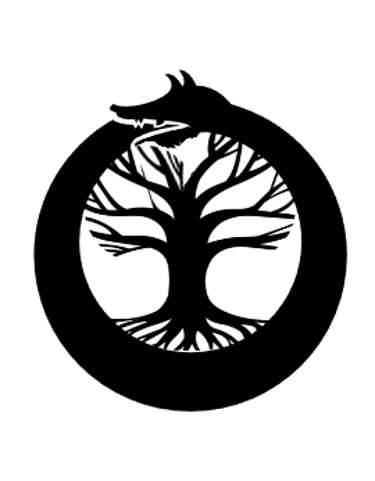Ancient Butchery
With the patience of woodland things
the wolf waits with the head.
The head itself
unnatural, bodiless,
remains aloof,
no baser nature grounds it to the Earth -
the baser nature is in the wolf, half-tamed,
not touching this strange meat.
This land is not yet the land I know,
The great flat arc of sky
hangs over the flat land,
but land
is mostly water and a wolf
can sit in vigil for a saint.
I see him, like a woodcut, crowned,
or else a martyr, with a haloed line,
smart around his upright face, around his clean-drawn stump.
But his death was a bloody, hacking thing,
all gristle, brutal gore. The whip
to flense the skin from flesh,
the spears to crunch through organ,
and through bone; holy passion
made butchery - joints,
veins, cartilage. His head a sad mess
bruised,
tragic, muddied by the ground. A king
cut down, the Royal body only
tortured flesh.
There were still wolves - hard
to remember that,
animals, not worn-through metaphor.
I’ve never seen a body
cut-apart - but then,
when the Broads
had not been cut, when Dunwich
was a kingly town above the waves,
such things were not much wondered on.
The sea, it takes so much -
a metre every year. From Doggerland,
it throws back bones,
flint tools, horse’s teeth.
Fossilised, you can gather them,
trace out the marks of ancient butchery.
The sea, it brought the ships,
the Danes, brought the end
of this, the last Anglian King.
What remains
is more story than flesh, but his tale
is the kind
that you can build a city on.
Gathered up, piecemeal
from the martyrs of the early church
it makes the ground for hearths packed
with burning peat, for houses
thatched with rushes
grown in lakes the peat had made.
Gather up the corpse of him,
lay it in the ground
that weighs heavy with the water of the fens,
let piety seep in to fill the hole
like water,
and after water - roots, and roots
clog up with silt and in that silt,
comes alder, oak, and finally dry land.
And so it is wattle and daub
give way to timber, stone,
to reliquary, and shoeless feet,
to click of pilgrim gold
and masses sung, as though these things
could make holy posterity, as though
silence could not swallow them whole.
The only hard proofs left to us
are coins. His body gone,
leaving just
the shape of words in all the places
his flesh touched ground, and the city built
around his resting place. His name
laying, as his head once lay,
on earth whose sand,
whose chalk, whose mudstone cliffs
give themselves to fenland and to waves,
whose Broads
are colonised by reed bed conspiracy,
by rushes tall as bristling spears,
whispering in the wind.
AW Earl is a writer and storyteller. They studied English Literature and Creative writing at the University of East Anglia, and have performed their own work and traditional folktales across the UK. Among other venues, their poetry has been published by The Selkie, Renard Press, and Salò Press, while their non-fiction has appeared in Lighthouse Journal and a collection by Watkins Press. Their debut novel was published in 2018.
